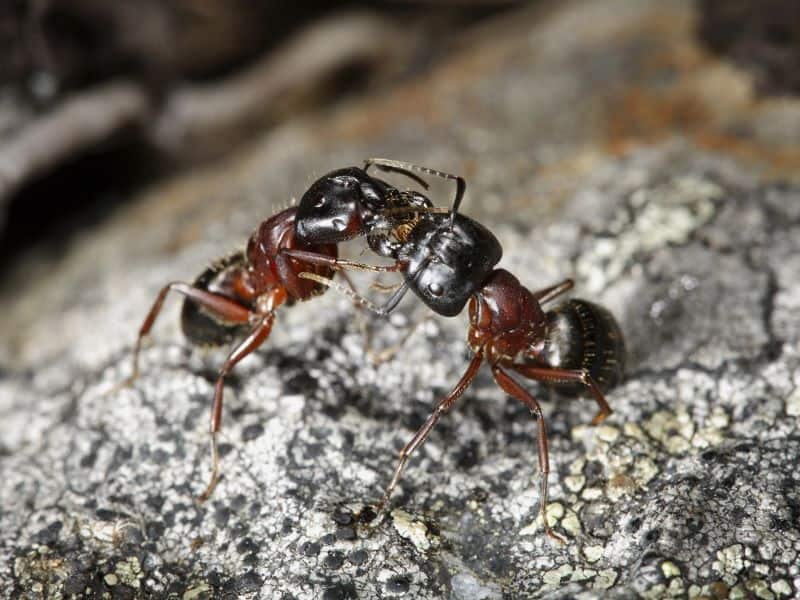As a cat owner, you may have noticed your feline friend snacking on ants from time to time. While it’s natural for cats to be curious and hunt small prey, you may be wondering if it’s safe for them to eat ants.
After all, ants are often associated with dirt and pests, and you may be concerned about the potential dangers of allowing your cat to consume them.
Cats can generally eat ants safely in moderation. Ants can provide a source of protein for cats and can also help to keep their teeth clean and healthy. However, it’s important to be aware that some ants may contain pesticides or other toxins that can be harmful to cats if ingested, and it’s possible for cats to consume too many ants, which could lead to digestive issues or an allergic reaction. To ensure your cat’s safety, it’s important to supervise their ant-eating habits and provide a balanced diet with a variety of protein sources.
In this article, we’ll explore the potential risks and benefits of allowing your cat to eat ants, as well as some tips for ensuring your cat’s safety and overall health.

Why Do Cats Eat Ants?
Cats may eat ants for a variety of reasons. One reason is that ants can be a natural source of protein for cats, which can help to support their muscle mass and overall health.
Ants can also provide a crunchy texture that cats find appealing, which can help to keep their teeth clean and healthy. In addition to these potential benefits, cats may simply enjoy the taste of ants or find the act of hunting and catching them to be stimulating.
It’s also possible that cats may eat ants as a way to supplement their diet if they are not getting enough nutrients from their regular food.
However, it’s important to be mindful of the potential risks associated with allowing cats to eat ants and to ensure that they are getting a balanced diet with a variety of protein sources.
The Benefits of Allowing Cats to Eat Ants
As any cat owner knows, cats are natural hunters and are often attracted to small prey, including insects. While it’s important to consider the potential risks and benefits of allowing your cat to eat ants, there are some clear advantages to letting them enjoy this crunchy treat.
One benefit of allowing cats to eat ants is that they are a natural source of protein. Protein is an essential nutrient for cats, and it helps to support their muscle mass and overall health. Ants are a good source of high-quality protein, and they can be a useful addition to your cat’s diet, particularly if they are not getting enough protein from their regular food.
In addition to providing protein, ants can also help to keep your cat’s teeth clean and healthy. Cats’ teeth are prone to build-up of plaque and tartar, which can lead to tooth decay and gum disease. The crunchy texture of ants can help to remove this build-up and keep your cat’s teeth clean and healthy.
Overall, while it’s important to be mindful of the potential risks of allowing your cat to eat ants, there are some clear benefits to be gained from this tasty treat. By providing a balanced diet and supervising your cat’s ant-eating habits, you can allow them to enjoy the benefits of this protein-rich snack while minimizing the risks.
The Potential Dangers of Allowing Cats to Eat Ants
While there are some benefits to allowing cats to eat ants, it’s important to be aware of the potential dangers as well. One risk to consider is that some ants may contain pesticides or other toxins that can be harmful to cats if ingested. These toxins can accumulate in a cat’s body over time and may cause serious health issues.
Another potential danger is that it’s possible for cats to consume too many ants, which could lead to digestive issues or even an allergic reaction. Cats may experience symptoms such as vomiting, diarrhea, or abdominal pain if they eat too many ants or if they are allergic to them. In severe cases, an allergic reaction could be life-threatening and require immediate medical attention.
Overall, while it is generally safe for cats to eat ants in moderation, it’s important to be aware of the potential risks and to take precautions to ensure your cat’s safety. By supervising your cat’s ant-eating habits and providing a balanced diet with a variety of protein sources, you can minimize the risks and allow your feline friend to enjoy the benefits of this tasty treat.
How to Safely Allow Your Cat to Eat Ants
If you’ve decided to allow your cat to enjoy the benefits of eating ants, there are a few precautions you can take to ensure their safety.
First and foremost, it’s important to supervise your cat’s ant-eating habits and make sure they are only consuming a small number of ants at a time. This will help to minimize the risk of digestive issues or an allergic reaction.
In addition to supervising your cat’s ant-eating habits, it’s also important to offer a variety of other protein sources to ensure they are getting a balanced diet. This can include commercial cat food or cooked meat, as well as other types of insects such as freeze-dried or cooked crickets.
If you have concerns about the safety of the ants in your area, you may want to consider providing your cat with a safer source of insects. Freeze-dried or cooked crickets, for example, can be a good alternative to live ants and can provide your cat with a similar source of protein and crunchy texture.
Overall, by following a few simple precautions and offering a balanced diet, you can allow your feline friend to enjoy the benefits of this protein-rich treat while minimizing the risks. So, it is always better to be cautious and keep an eye on your cat’s ant-eating habits.
Conclusion
In conclusion, it is generally safe for cats to eat ants in moderation. While there are some potential risks to consider, such as the presence of toxins or the risk of an allergic reaction, these risks can be minimized by following a few simple precautions.
By supervising your cat’s ant-eating habits and offering a balanced diet with a variety of protein sources, you can allow your feline friend to enjoy the benefits of this protein-rich treat while minimizing the risks.
Overall, it is important to use caution and common sense when allowing your cat to eat ants, and to seek medical attention if you have concerns about their health.
